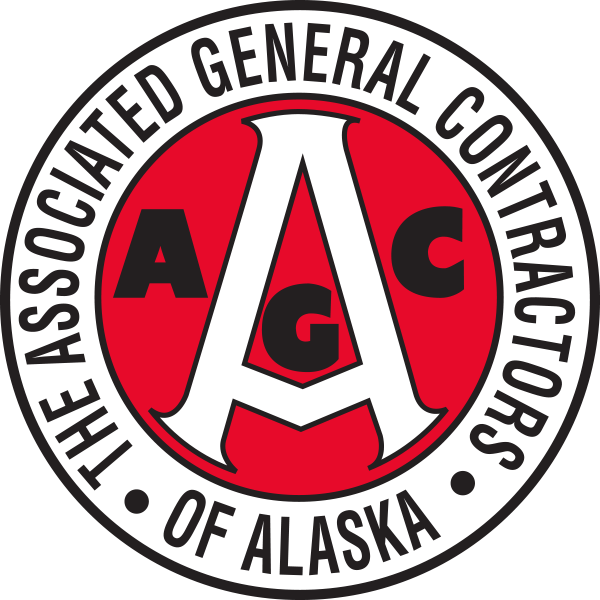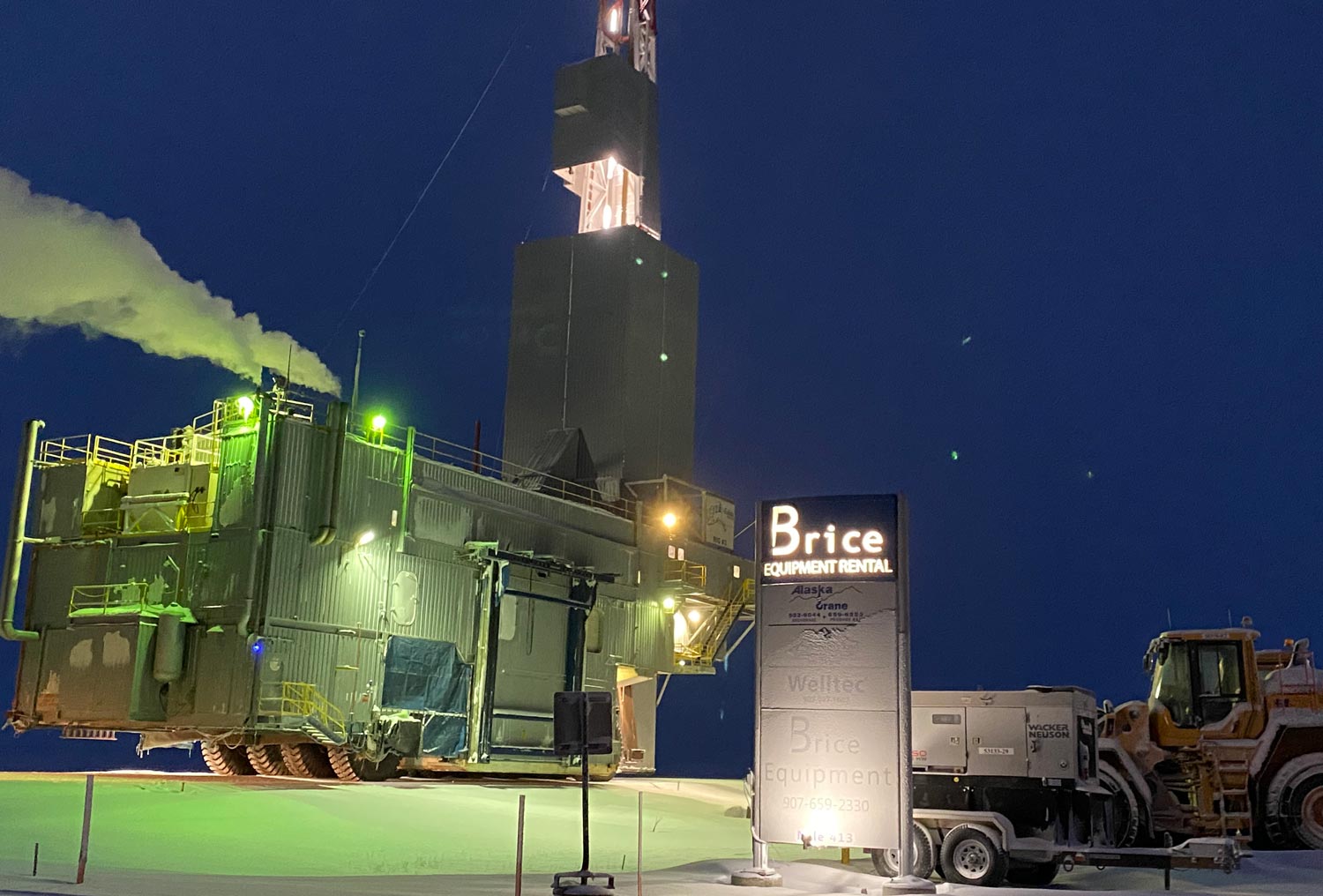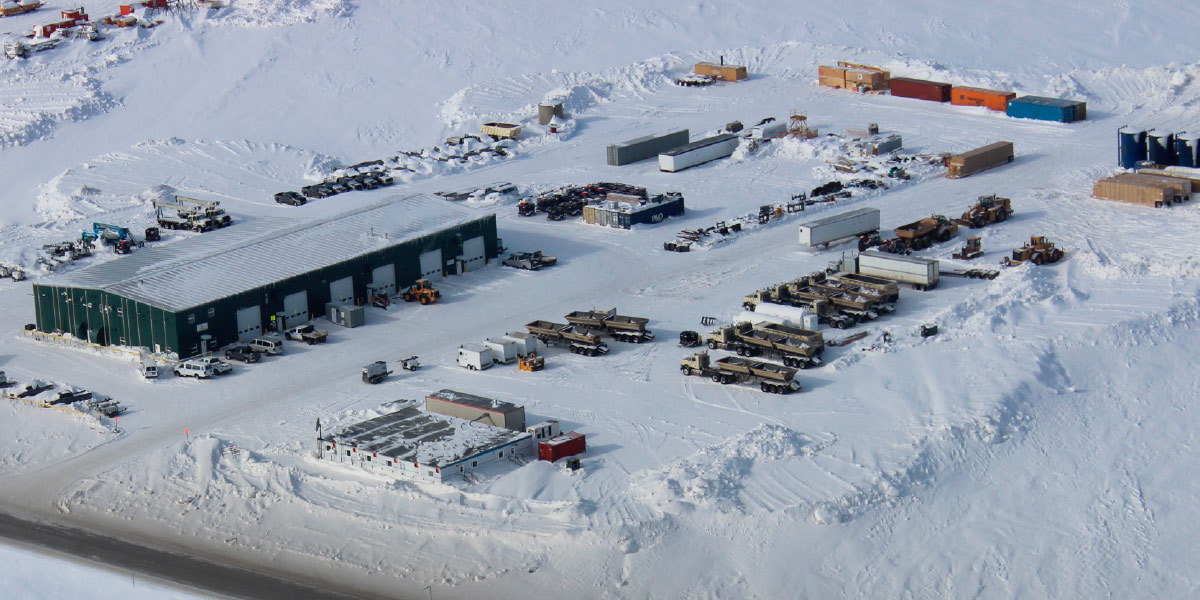
rice Equipment, under the Brice Incorporated umbrella, can be found in both Fairbanks and Deadhorse, and maybe even on the side of an Arctic ice road repairing a tire or two.
Brice Incorporated began in 1961, and is responsible for building some of the interior’s first roads and infrastructure, like Chena Hot Springs Road. The company was one of the original contractors of the trans-Alaska pipeline. In 2006, the company started Brice Equipment to provide construction support and equipment for the oil, gas and construction industry on Alaska’s North Slope. Brice Equipment now has a fleet of more than 300 pieces of equipment, ranging from heavy construction machinery to mobile support equipment.
“We saw a need for versatile equipment rental in Deadhorse,” says Christian Gou-Leonhardt, an operations manager with Brice Equipment. “Essentially, we’ve been growing since then.
The company specializes in supporting industry in the Arctic and in other remote areas. Services the company provides include equipment rental, heavy construction machinery, mobile support equipment, job-site office trailers, portable self-contained arctic bathroom units, upstream and midstream operations, and construction. In addition to its North Slope work, the company also offers pipeline support services in Cook Inlet. For five years, Brice Equipment has been assisting Hilcorp Alaska LLC with pipeline inspection programs, other maintenance on their platforms, and more.
The company built a 21,000-square-foot shop in Deadhorse in 2013, just south of the airport. The shop offers an onsite tire shop and tire services, as well as mobile tire repair service.
“It’s one of the first things you’ll run into if you’re driving up the Haul Road—and that has turned out to be a handy location for truck drivers and truck traffic moving up and down the Haul Road,” says Gou-Leonhardt. “We’re right there.”
COVID-19 has affected industries across the country, and Brice Equipment was no exception. Gou-Leonhardt says the company has been using the pandemic as an opportunity to modernize its fleet and audit some of the company’s processes to better streamline certain aspects of the business.
Photo courtesy of Christian Gou-Leonhardt of Brice Equipment.

Photo courtesy of Christian Gou-Leonhardt of Brice Equipment.
He says the company’s tire shop has remained busy even through the pandemic and with less work on the North Slope. There’s always a need to get tires fixed, he says.
One way the company seeks to go above and beyond is through their mobile tire service. They will meet clients where they are at, whether it’s in Fairbanks, Deadhorse, or on an ice road in between.
“Our tire techs will come to you,” says Gou-Leonhardt. “So, we’ll be fixing massive loader tires out on the ice roads somewhere—wherever it is that we need to be.”
Gou-Leonhardt says the company prides itself on being able to anticipate what clients need, and to modify equipment and rental offerings in a way that really works for the customer.
“So, that could be customizing a pumphouse with a light-plant generator so that it’s specific to a location and a project and is something that checks all the boxes for the clients,” says Gou-Leonhardt. “They don’t have to rent seven different items. They have one unit.”

Photo courtesy of Andre Vachon of Brice Equipment
“The people at Brice are very knowledgeable and client focused,” says Cassee. “They are solution orientated—adding value to our overall performance.”
Gou-Leonhardt says Alaska is a community-oriented place, which is what the company enjoys about being a member of Associated General Contractors of Alaska. He says the company works very closely with about every other company up on the North Slope, and there’s always give and take—including with their competitors.
“Whether it is heavy equipment, aerial personnel lifts, or other arctic-grade support equipment, Brice Equipment has you covered,” says David Myers, director of business development at STG Incorporated & Alaska Crane. “They always take a team approach to finding the best solutions to suit your needs.”
“Alaska is large geographically, but if you go to the airport in Anchorage, you’re bound to run into half a dozen people you know,” says Gou-Leonhardt. “That’s kind of the point: it’s a small community up here… It’s just the nature of the business. We help each other out in a very remote and challenging environment. I would say that’s the core of our contractor community.”